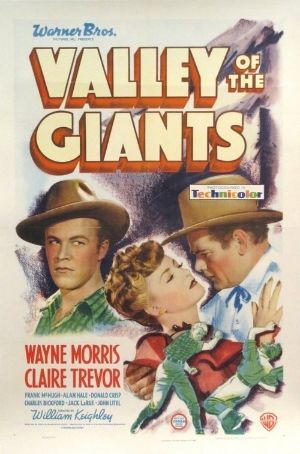
One of the side effects of being trained as a firefighter is that movie explosions tend to snap my suspenders of disbelief far too easily, and it's a real pleasure to see one done right. In the movie, one of the characters builds a dam to deny Bill the means of moving cut timber to the mill and thereby pay off his bank note in order to save the valley of redwoods protected on his family's land, and at the end of the movie, Bill and his friends blow up the dam. The film crew didn't fool around with models - they blew up an actual dam, and when I say blew up, I mean with a load of TNT big enough to reduce this sizeable damn to splinters in an instant. Watch this scene, and ever-after the jellied-gas explosions you see in modern movies will look like some special effects guy lighting his farts by comparison. It is truly epic destruction in the service of the story.
A post in a thread - on railroading, not explosions - at theRPGsite reminded me of Valley of the Giants today. At one point the thread turned to save-the-world adventures in roleplaying games, which led to the following.
. . . [D]o you agree that "stop the end of the world" would be harder to pull off [in a sandbox setting] without the railroad? Is that not at least part of why you avoid it?I'll be honest - if the poster of this comment and I were the last roleplaying gamers on Earth, I would opt to play solitaire. There is nothing about the way this guy presents his games that I find appealing, and to be fair, he's no fan of me, either.
But he raises an interesting point: does running a sandbox setting, in which it's accepted that the players are free to ignore anything that's not actively trying to get in their faces, make running end-of-the-game-world scenarios more challenging? With the potential for missing clues and chasing red herrings, it's entirely possible that even players and their characters engaged in such a scenario could fail, and fail miserably.
So, is this why "stop the end of the world" scenarios are uncommon in sandboxes?
Obviously I can't speak for everyone who runs sandbox-style settings, but I can say this about my own campaigns: I don't do end-of-the-world because it's hard - I don't do it because it's so mind-numbingly trite and dull.
Now, given my penchant for running historical roleplaying games, usually without a fantastical element, this probably seems like a pretty academic concern; even if I didn't find it so boring, there's very little chance for a world-ending cataclysm in my campaign. The examples provided by some the many movie-retellings on The Three Musketeers, however, suggest a sort of world-shaking cliché, typically a plot by Cardinal Richelieu to seize control of France from the king. Stephen Herek's movie finds Tim Curry's Cardinal, for example, planning to replace Louis XIII by assassination and then taking the throne by a vaguely outlined combination of popular acclaim and control by his guards.
Contrast this with the original story, and the actual historical events of the period: Richelieu attempts to embarrass the queen and start a war with England in Dumas' tale, while a more likely historical motivation could be driving a wedge between the king and his Spanish-born queen to further his geopolitical aims, or even just to humiliate Anne of Austria as she is alleged to have humiliated the Cardinal.
For some reason, the Cardinal's scheme to secure and expand power and influence by ruining the reputation of a royal rival isn't engaging enough for some authors and screenwriters; they need a villain with a grandiose, historically improbable plan to do away with the king and take his throne instead. To me, this is the cape-and-sword equivalent to the "end of the world" scenario, a plot that the adventurers must thwart or see epic changes in the world of the story or campaign.
From reading intreweb forums, I gather that some gamers cannot enjoy themselves if they're aren't saving the world, but in the campaigns I run, rarely will you find anything so elaborate. Rather, you will find situations like that of Valley of the Giants: a landowner trying to preserve his family fortune and protect an important part of our natural heritage from the skullduggery of rapacious speculators, with political machinations and strongarm tactics alike by all the parties concerned. If that doesn't sound like the stuff of adventure, I honestly don't know what does.
And in the end, a small piece of the world is saved. That's more than enough for me.

One of my sessions for The Queen's Cavaliers involved saving Sir Fluffington, the Prince-Consort's favorite spaniel.
ReplyDeleteI love that.
DeleteExcellent!
DeleteI must say, my character would probably love to bicker about having to save "a damn dog", but I as a player would feel that so much more plausible and entertaining than another "End World Conspiracy" or whatever.
ReplyDeleteConsider your "distressed landowner trying to protect his heritage from the rapacity of man" stolen. New orleans, 1876, I'm sure a plantation owner could be pressured by a remorseless urban planner and its bruisers to make way for a new neighborhood. Let's see if it catch my players' fancy.
Good luck!
DeleteI generally dislike & avoid actual Save the World; I did go with in my 4e campaign as that's pretty much what 4e expects. For sandbox,I think Save the World should be as rare in-game as in real life, ie vanishingly rare. If it did come up it would probably be as a result of PC action in one of the more fragile settings filled with Tharizdun type Ancient Evils potentially unleashed by PC action/negligence. The best threats are much more local scale, although they may sometimes mean eg war enveloping the PCs' home town - but the sandbox PCs can always leave.
ReplyDelete